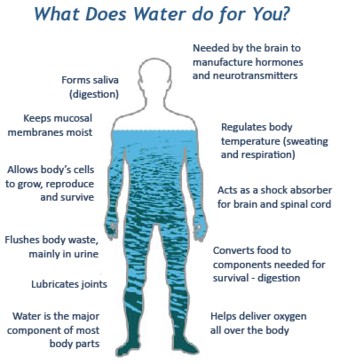Water is essential for life. We need it to survive. But how much of our bodies are actually made up of water? The answer might surprise you.
The human body is largely composed of water, highlighting its crucial role in numerous bodily functions. From the brain to the bones, water is a key component, influencing everything from temperature regulation to nutrient transport.
The Percentage of Water in the Human Body
Up to 60% of the human adult body is water. However, this percentage varies depending on factors like age, gender, and body composition. According to Mitchell and others (1945), different organs have different water content:
- Brain and Heart: 73% water
- Lungs: 83% water
- Skin: 64% water
- Muscles and Kidneys: 79% water
- Bones: 31% water
 Graphic illustrating the importance of water in the human body, showing the percentage of water in various organs and its key functions.
Graphic illustrating the importance of water in the human body, showing the percentage of water in various organs and its key functions.
Why is Water Important for the Human Body?
Water serves many vital functions. It’s not just about quenching thirst; it’s about maintaining the body’s equilibrium.
- Nutrient for Cells: Water is a building block for every cell in the body.
- Temperature Regulation: It regulates internal body temperature through sweating and respiration.
- Nutrient Transport: Carbohydrates and proteins are metabolized and transported by water in the bloodstream.
- Waste Removal: Water helps flush out waste through urination.
- Shock Absorption: It acts as a shock absorber for the brain, spinal cord, and fetus.
- Saliva Formation: Water is a key component of saliva.
- Joint Lubrication: It lubricates joints, allowing for smooth movement.
Factors Affecting Body Water Percentage
Several factors influence the amount of water in our bodies:
- Age: Babies have the highest percentage of water, around 78% at birth. This decreases to about 65% by one year old. As we age, the percentage of water in our bodies tends to decrease.
- Gender: Men generally have a higher percentage of water (around 60%) compared to women (around 55%). This is because women typically have more fatty tissue.
- Body Composition: Fat tissue contains less water than lean tissue. People with more body fat will have a lower percentage of water.
Daily Water Intake Recommendations
How much water do we need to drink each day? The recommended daily intake varies depending on individual factors. Generally, adult males need about 3 liters (3.2 quarts) per day, while adult females need about 2.2 liters (2.3 quarts) per day. Keep in mind that we also get water from the food we eat, especially fruits and vegetables.
Water intake is more than just drinking water. Here are ways to get water into your system:
- Water rich fruits: Watermelons, cantaloupe, strawberries
- Veggies: Cucumbers, celery, lettuce
- Soups and Broths: Nourishing and hydrating and comforting.
- Herbal Teas: These are a tasty way to increase your water consumption
The Importance of Water’s Properties
The unique qualities and properties of water make it essential for life. Its ability to dissolve substances allows cells to use nutrients, minerals, and chemicals in biological processes. Water’s surface tension also plays a role in transporting materials throughout the body.
Staying Hydrated for Optimal Health
Maintaining proper hydration is crucial for overall health and well-being. Water is involved in almost every bodily function, from regulating temperature to transporting nutrients. Understanding How Much Water Is In Your Body and how to maintain adequate hydration can lead to a healthier life.
Sources:
- Mitchell, H.H., Hamilton, T.S., Steggerda, F.R., and Bean, H.W., 1945, The chemical composition of the adult human body and its bearing on the biochemistry of growth: Journal of Biological Chemistry, v. 158, issue 3, p. 625-637.
- The Nature of Water: Environment Canada
- Project WET (PDF)
